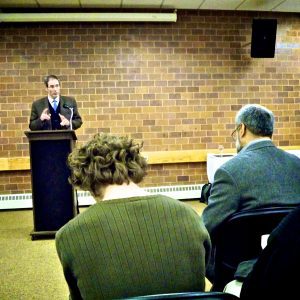BOSTON, MA – The main thesis of the paper I delivered today at the Boston Area Colloquium for Ancient Philosophy is that the practice of Socratic political speaking and the practice of Platonic political writing are intimately interconnected but distinct.

To develop this position, I focused on the famous passage from the Gorgias in which Socrates claims to be one of the few Athenians who attempt the political art truly and goes on to articulate the nature of his political practice as a way of speaking toward the best (521d6-e2).
I then trace the ways Socrates attempts to use words to turn Gorgias, Polus and Callicles toward the best in the course of the dialogue. What emerges is a picture of a philosophical friendship between Gorgias and Socrates rooted in a common concern for justice.
Yet, Socrates’ success with Gorgias is overshadowed by his failure to convince Polus or Callicles to allow a concern for truth, justice and the good to animate the course of their lives. Even so, the political practice of Platonic writing is shown in the paper to be designed to awaken in us, the readers, precisely such a concern to live a life in which words are spoken in ways that uncover the truth and are directed toward the best.
Here is a slideshow of images from the visit:
There were a number of important points developed in the question and answer period to which I will point here, but they remain issues I am thinking about as I develop this larger book project on the practices of Socratic and Platonic politics.
Nalin Ranasinghe of Assumption College, who received his PhD from Penn State in the late 1980’s, delivered a very generous response to the paper in which he agreed in large part with the project in general and my reading of the Gorgias in particular, a text on which he has written a book himself: Socrates in the Underworld: On Plato’s Gorgias.
He did raise, however, a number of concerns that echo some of the things I heard in response to the seminar I gave on the Apology in Colombia last month.
Just as Catalina González Quintero had pressed me in Bogotá to delineate the negative side of Socratic politics in which Socrates provokes and punishes his interlocutor, Nalin was concerned that I did not do full justice to the agonistic dimension of the Gorgias, and particularly the fact that Socrates was punishing Callicles and Polus with public shame. In the question and answer period, this issue was amplified with a number of questions about how rarely Socrates actually succeeds in cultivating in those he encounters a disposition to speak words “toward the best” and to respond to others with a shared concern for the truth.
To respond adequately to this issue requires detailed textual analysis of specific dialogues in which it can be argued that Socrates does succeed in cultivating the active desire to speak and seek the truth, as for example, I argue happens to some degree with Gorgias in the Gorgias, and in a different and less developed way with Hippocrates in the Protagoras; and Glaucon shows some signs of this in the Republic too.
Other questions that arose concerned the degree to which the Socratic activity of philosophizing can be called “political” in any meaningful sense. To this, however, I would defend the central claim of the project which is that “politics” needs to be rethought in terms of the activities that most effectively open the possibility of cultivating healthy communities of relationship between people. Such an understanding of politics would imply that “politics” is at work each time two people enter into relation with one another.
